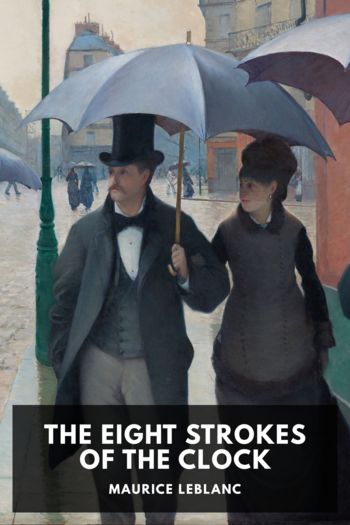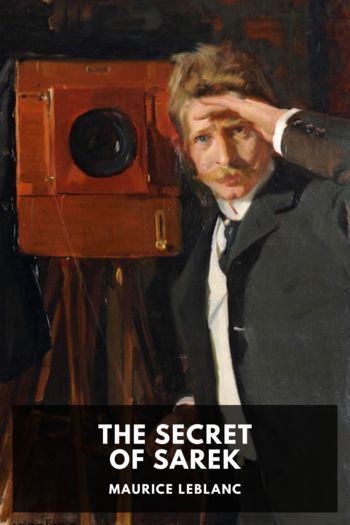The Eight Strokes of the Clock - Maurice Leblanc (reading in the dark .TXT) 📗

- Author: Maurice Leblanc
Book online «The Eight Strokes of the Clock - Maurice Leblanc (reading in the dark .TXT) 📗». Author Maurice Leblanc
“Mlle. Aymard! … She has had the coolness … she has had the audacity … !”
Then Jean Louis, recovering his self-possession, laid hold of his mother d’Imbleval and pushed her out of the room by a door on the left and next of his mother Vaurois and pushed her out of the room by a door on the right. Then, returning to his two visitors, he opened the envelope and read, in an undertone:
“I am to be married in a week, Jean Louis. Come to my rescue, I beseech you. My friend Hortense and Prince Rénine will help you to overcome the obstacles that baffle you. Trust them. I love you.
“Geneviève.”
He was a rather dull-looking young man, whose very swarthy, lean and bony face certainly bore the expression of melancholy and distress described by Geneviève. Indeed, the marks of suffering were visible in all his harassed features, as well as in his sad and anxious eyes.
He repeated Geneviève’s name over and over again, while looking about him with a distracted air. He seemed to be seeking a course of conduct.
He seemed on the point of offering an explanation but could find nothing to say. The sudden intervention had taken him at a disadvantage, like an unforseen attack which he did not know how to meet.
Rénine felt that the adversary would capitulate at the first summons. The man had been fighting so desperately during the last few months and had suffered so severely in the retirement and obstinate silence in which he had taken refuge that he was not thinking of defending himself. Moreover, how could he do so, now that they had forced their way into the privacy of his odious existence?
“Take my word for it, monsieur,” declared Rénine, “that it is in your best interests to confide in us. We are Geneviève Aymard’s friends. Do not hesitate to speak.”
“I can hardly hesitate,” he said, “after what you have just heard. This is the life I lead, monsieur. I will tell you the whole secret, so that you may tell it to Geneviève. She will then understand why I have not gone back to her … and why I have not the right to do so.”
He pushed a chair forward for Hortense. The two men sat down, and, without any need of further persuasion, rather as though he himself felt a certain relief in unburdening himself, he said:
“You must not be surprised, monsieur, if I tell my story with a certain flippancy, for, as a matter of fact, it is a frankly comical story and cannot fail to make you laugh. Fate often amuses itself by playing these imbecile tricks, these monstrous farces which seem as though they must have been invented by the brain of a madman or a drunkard. Judge for yourself. Twenty-seven years ago, the Manoir d’Elseven, which at that time consisted only of the main building, was occupied by an old doctor who, to increase his modest means, used to receive one or two paying guests. In this way, Madame d’Imbleval spent the summer here one year and Madame Vaurois the following summer. Now these two ladies did not know each other. One of them was married to a Breton of a merchant-vessel and the other to a commercial traveller from the Vendée.
“It so happened that they lost their husbands at the same time, at a period when each of them was expecting a baby. And, as they both lived in the country, at places some distance from any town, they wrote to the old doctor that they intended to come to his house for their confinement. … He agreed. They arrived almost on the same day, in the autumn. Two small bedrooms were prepared for them, behind the room in which we are sitting. The doctor had engaged a nurse, who slept in this very room. Everything was perfectly satisfactory. The ladies were putting the finishing touches to their baby-clothes and were getting on together splendidly. They were determined that their children should be boys and had chosen the names of Jean and Louis respectively. … One evening the doctor was called out to a case and drove off in his gig with the manservant, saying that he would not be back till next day. In her master’s absence, a little girl who served as maid-of-all-work ran out to keep company with her sweetheart. These accidents destiny turned to account with diabolical malignity. At about midnight, Madame d’Imbleval was seized with the first pains. The nurse, Mlle. Boussignol, had had some training as a midwife and did not lose her head. But, an hour later, Madame Vaurois’ turn came; and the tragedy, or I might rather say the tragicomedy, was enacted amid the screams and moans of the two patients and the bewildered agitation of the nurse running from one to the other, bewailing her fate, opening the window to call out for the doctor or falling on her knees to implore the aid of Providence. … Madame Vaurois was the first to bring a son into the world. Mlle. Boussignol hurriedly carried him in here, washed and tended him and laid him in the cradle prepared for him. … But Madame d’Imbleval was screaming with pain; and the nurse had to attend to her while the newborn child was yelling like a stuck pig and the terrified mother, unable to stir from her bed, fainted. … Add to this all the wretchedness of darkness and disorder, the only lamp, without any oil, for the servant had neglected to fill it, the candles burning out, the moaning of the wind, the screeching of the owls, and you will understand that Mlle. Boussignol was scared out of her wits. However, at five o’clock in the morning, after many tragic incidents, she came in here with the d’Imbleval baby, likewise a boy, washed and tended him, laid him in his cradle and went off to help Madame Vaurois, who had come to herself and was crying out, while





Comments (0)